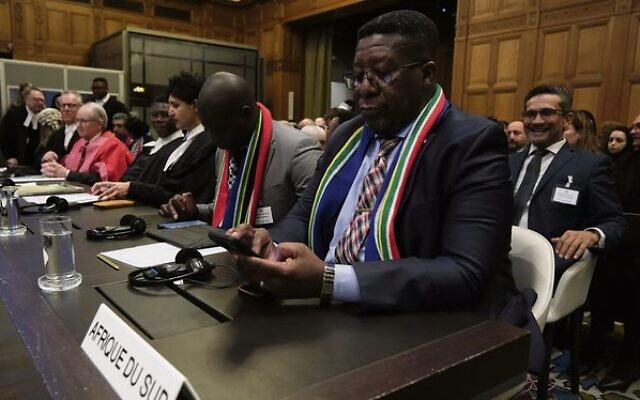Israel back at world court
Prime Minister Benjamin Netanyahu's office said in a statement that the case that opened on Monday was "aimed at harming Israel's rights to defend itself from existential threats".
(THE TIMES OF ISRAEL) Israel is applying an even more extreme version of apartheid against Palestinians in the West Bank than South Africa had against Blacks before 1994, Pretoria told the world’s top court on Tuesday.
“It is indistinguishable from settler colonialism. Israel’s apartheid must end,” said Vusimuzi Madonsela, South Africa’s ambassador to the Netherlands, where the International Court of Justice (ICJ) is based.
He said South Africa had a “special obligation” to call out apartheid wherever it occurs and ensure it is “brought to an immediate end”.
An unprecedented 52 countries are taking the stand at the ICJ, which has been asked to provide a non-binding “advisory opinion” on the legal implications of Israel’s control of Palestinian territories.
Israel rejects any allegation of apartheid, saying its own Arab citizens enjoy equal rights. Israel also notes that it granted limited autonomy to the Palestinian Authority at the height of the peace process in the 1990s and withdrew all its soldiers and settlers from Gaza in 2005.
Israel is not participating in the oral hearings but sent a written contribution in which it described the questions the court had been asked as “prejudicial” and “tendentious”.
Prime Minister Benjamin Netanyahu’s office said in a statement that the case that opened on Monday was “aimed at harming Israel’s rights to defend itself from existential threats”. The case is separate from that brought by Pretoria against Israel for alleged genocide during its current offensive in Gaza.
Palestinian Authority Foreign Minister Riyad Al-Maliki urged the judges to call for an end to the occupation “immediately, totally and unconditionally”.
The oral arguments presented by the Palestinian representatives almost entirely ignored the political nature of the Israeli-Palestinian conflict over the territories, past efforts to resolve the dispute, and the ongoing applicability of the Oslo Accords to resolving it in a political, not legal, framework.
The United Nations asked the ICJ in December 2022 to provide guidance on the “legal consequences arising from the policies and practices of Israel in the Occupied Palestinian Territory, including East Jerusalem”.
The proceedings on Monday began six days of hearings over the UN request. The court will rule “urgently” on the affair, probably by the end of the year.
The Palestinian Authority is seeking a finding that Israeli rule in the West Bank and East Jerusalem is illegal, and that Israel must end that rule, dismantle Israeli settlements and provide restitution to Palestinians.


comments